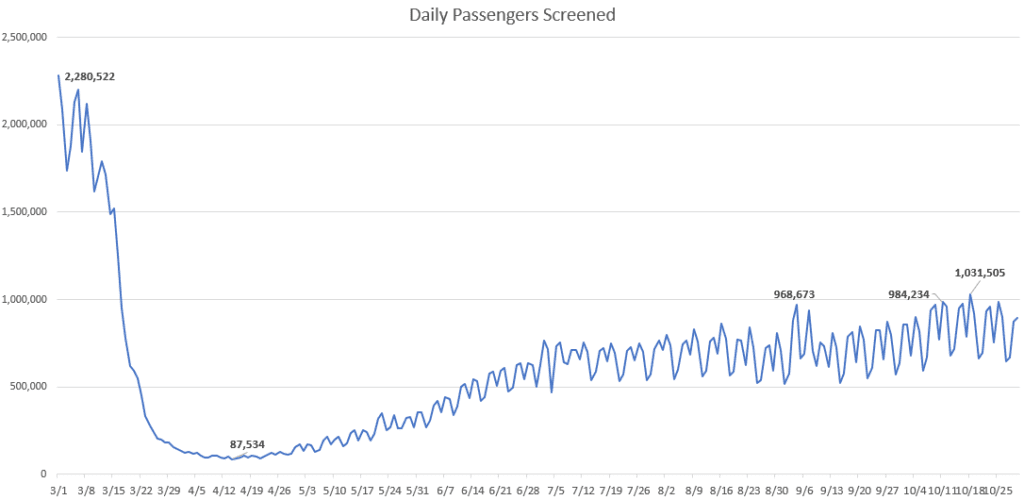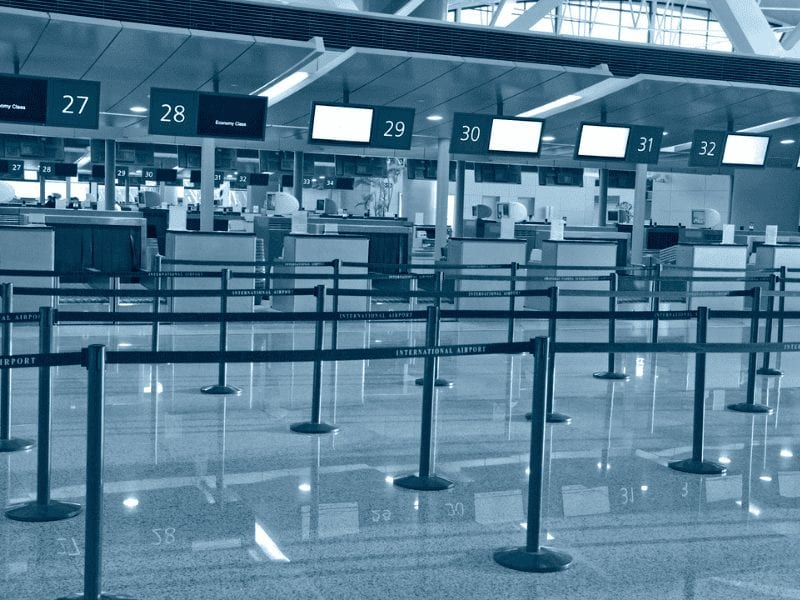One travel CEO has an idea to help jumpstart the struggling travel industry: tax breaks for travelers. Booking.com CEO Glenn Fogel penned an op-ed earlier this week suggesting tax incentives targeted at both consumers and businesses could help jolt the travel economy out of its slumber. It’s a novel idea.
The COVID-19 pandemic has decimated the travel industry. Air travel reached historic lows of ~80k daily travelers in mid-April at the height of the pandemic. While travel has made demonstrative progress since then (the most recent week averaged in the mid 800k daily travelers) the industry is still well short of its pre-COVID levels where it wasn’t uncommon to see 2m to 2.5m daily travelers.

Despite recent progress in daily travelers most of this traffic is leisure travelers who’ve been lured out by extremely competitive pricing and a (likely) overwhelming amount of pandemic/quarantine fatigue.
Business travel, which is the most profitable part of travel, has still not returned to meaningful levels. In the face of the pandemic, companies quickly adapted by sending employees to work from home, eliminating all non-essential travel and moving to a world dominated by Zoom meetings.

And it worked.
It worked really well.
Employees have settled into their new normal. Productivity is up and costs are down. Way down.
Amazon recently reported that it had saved more than a billion dollars in travel costs since the pandemic. Yes, $1B. Meanwhile, Amazon’s sales, profit, and stock have all risen to extraordinary levels.
Some business travel is still occurring and it has increased to a certain extent, but it remains a minuscule amount of the overall travel. This is despite the relative safety of air travel, the low risk of actually dying from COVID and extremely competitive pricing.
Companies appear to be reluctant to give back those travel savings they took straight to their bottom line – especially when many companies are experiencing increased productivity from their remote workers and whose customers are still buying.
Maybe business travel isn’t so essential.
It’s this lackluster restart to business travel that’s caused folks like Glenn Fogel, Booking.com’s CEO, to float creative ways to shock the industry out of its doldrums.

In his Yahoo Finance op-ed, Fogel wrote, “…the desire for the travel industry to recover is not in question. Neither is the need: Travel is a foundational pillar of the global economy, and as such, the global economy cannot fully recover until the travel industry recovers.”
Did you catch that last part? The global economy cannot fully recover until the travel industry recovers.
Fogel further notes, “We cannot let the fight against this virus become political.†America needs “a targeted program that makes it cheaper to travel, give Americans that incentive, that tax break to go travel.â€
What will it take to get more travelers back in the air? Specifically, business travelers, but certainly the broader leisure travel industry is still way off its norms. Clearly, it hasn’t been deeply discounted tickets, cleaner aircraft (and marketing campaigns), rapid testing (like United is testing), saving middle seats, and so on – although all of those measures have clearly had some positive effect.
Southwest’s CEO Gary Kelley recently noted in a CNBC interview that it may be 10 years before business travelers return so they are shifting their focus to leisure travelers.
How do you convince a company that its not only safe to get its folks back on the road but also that they need to? Or at least could derive some benefit from it.
It’s clearly not from a lack of desire by business travelers themselves to travel. A recent survey revealed how traditional business travelers are ready to get back on the road. And that’s not limited to business travelers. Indeed, travelers in general, are ready to get back out. Travel Pulse recently reported that 99% of survey respondents (predominantly leisure travelers) are “eager to travel again.” And that many are already making plans for 2021.
This is where Fogel’s idea comes into play: tax incentives targeted at consumers and businesses to incent folks to get their butts into an airplane seat.
“We cannot let the fight against this virus become political. In order for travel to fully recover, we need to do everything we can to stimulate both the local and global economy to ensure people’s livelihoods are protected. One way governments can support businesses and consumers is by introducing tax credits and subsidies to help aid in the recovery while the pandemic continues to create uncertainty. Extra incentives will be needed to allow businesses to survive while determining how to rebuild consumer confidence during the “new normal.—
-Fogel
How might these look or work? Fogel doesn’t elaborate much beyond the above quote leaving the heavy lifting to politicians and lobbyists, but the idea is both novel and a familiar play.
Tax breaks have long been used as a means to jumpstart parts of the economy. In this case, though, questions remain on how and where such breaks would be deployed in ways that are meaningful to travelers and businesses.
For example, as a consumer, the easiest way to have a tax break make a difference is to make my ticket price cheaper. Any other means (like a deductions) is probably too abstract. For businesses, tax breaks that result in cheaper travel is a start, but it may not be enough, frankly. Especially when staring down the barrel of 9 months of increased worker productivity sans travel (and it’s costs).
What say you? How might tax breaks for travel be deployed to incentivize both business and leisure travel? Drop us a comment below or tweet us.
- Did you travel for work? Miss it? Here’s a gift guide for people who
travelused to travel for work.
- Fun Holiday Themed Face Masks
- US DOT giving out free masks to travelers
- Delta Face Mask Policy
- Southwest Face Mask Policy
- United Airlines Face Mask Policy
- Spirit Face Mask Policy
- British Airways Face Mask Policy
- Where to buy a Face Mask for Travel
- See all Face Mask Policies here
Affiliate Disclosure: As an Amazon Associate I earn from qualifying purchases. I may also earn commissions from other affiliate programs as applicable.

